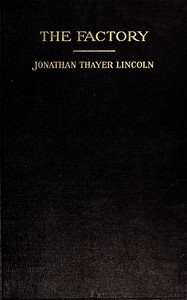The factory by Jonathan Thayer Lincoln
"The Factory" by Jonathan Thayer Lincoln is a socio-historical essay written in the early 20th century, specifically in the 1910s. The book explores the development of the factory system during the Industrial Revolution, detailing its significant impacts on social structures and labor dynamics. It likely focuses on how the rise of factories transformed not only manufacturing processes but also the societal landscape, emphasizing the complex relationship between labor and progress. In "The
Factory," Lincoln delves into the evolution of textile manufacturing, spotlighting key figures such as Richard Arkwright, whose innovations laid the groundwork for modern factories. The narrative tracks the transition from cottage industries to centralized factories, highlighting the ensuing social upheaval that accompanied the disruption of traditional livelihoods. Highlighting the hardships faced by factory workers, including exploitation and dire living conditions, the book ties these historical events to broader themes of class consciousness and the quest for labor rights. Ultimately, Lincoln presents the factory not merely as a physical space for production but as a catalyst for significant social change, setting the stage for future labor movements and democratic ideals. (This is an automatically generated summary.)
Read or download for free
| Reading Options | Url | Size | |||
|---|---|---|---|---|---|
| Read now! | https://www.gutenberg.org/ebooks/69958.html.images | 140 kB | |||
| EPUB3 (E-readers incl. Send-to-Kindle) | https://www.gutenberg.org/ebooks/69958.epub3.images | 344 kB | |||
| EPUB (older E-readers) | https://www.gutenberg.org/ebooks/69958.epub.images | 343 kB | |||
| EPUB (no images, older E-readers) | https://www.gutenberg.org/ebooks/69958.epub.noimages | 211 kB | |||
| Kindle | https://www.gutenberg.org/ebooks/69958.kf8.images | 775 kB | |||
| older Kindles | https://www.gutenberg.org/ebooks/69958.kindle.images | 757 kB | |||
| Plain Text UTF-8 | https://www.gutenberg.org/ebooks/69958.txt.utf-8 | 119 kB | |||
| Download HTML (zip) | https://www.gutenberg.org/cache/epub/69958/pg69958-h.zip | 537 kB | |||
| There may be more files related to this item. | |||||
Similar Books
About this eBook
| Author | Lincoln, Jonathan Thayer, 1869-1942 |
|---|---|
| LoC No. | 12001036 |
| Title | The factory |
| Original Publication | United States: Houghton Mifflin Company, 1912. |
| Note | "This essay is based upon a course of lectures delivered before the Amos Tuck school of administration and finance associated with Dartmouth college."--Note. |
| Contents | The industrial revolution -- Sir Richard Arkwright -- Mechanical inventions -- The factory system -- The factory towns -- Chartism -- The factory and social progress. |
| Credits | Bob Taylor, and The Online Distributed Proofreading Team at www.pgdp.net (This file was produced from images generously made available by The Internet Archive) |
| Reading Level | Reading ease score: 48.0 (College-level). Difficult to read. |
| Language | English |
| LoC Class | HD: Social sciences: Economic history and conditions, Production |
| Subject | Factory system |
| Category | Text |
| EBook-No. | 69958 |
| Release Date | Feb 5, 2023 |
| Most Recently Updated | Oct 19, 2024 |
| Copyright Status | Public domain in the USA. |
| Downloads | 335 downloads in the last 30 days. |
| Project Gutenberg eBooks are always free! | |

